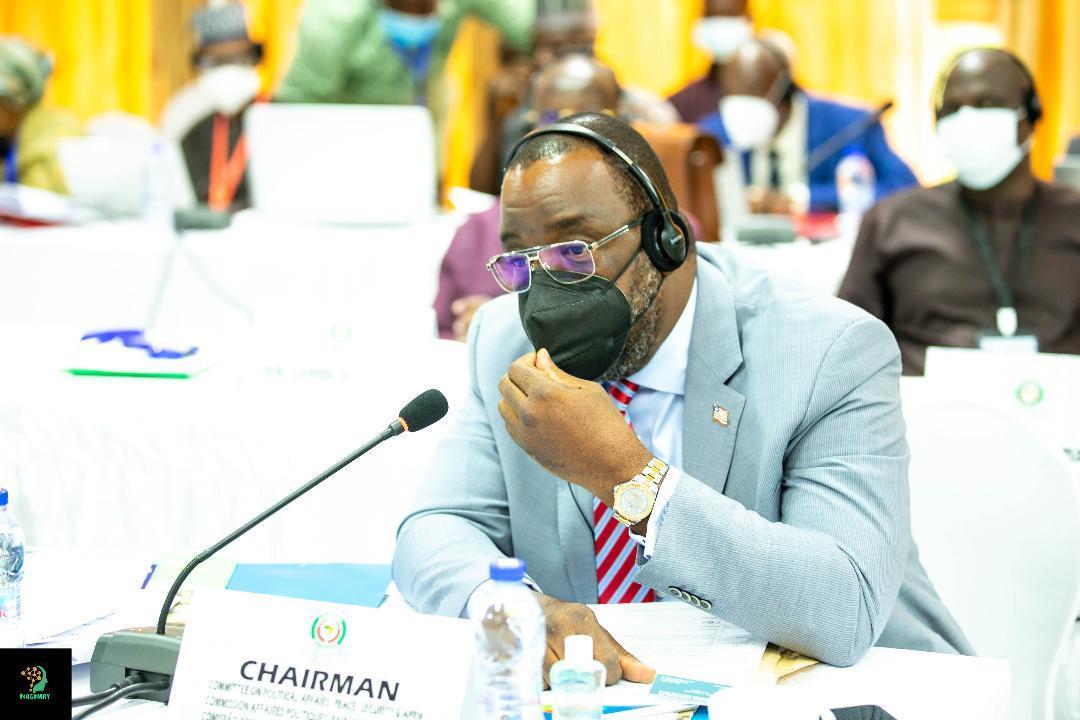Africa-Press – Liberia. Senator Edwin Melvin Snowe Jr., a seasoned Liberian lawmaker, holds a prestigious and sensitive position as a member of the Security Committee of the ECOWAS Parliament. This role affords him access to classified intelligence across West African states and makes him a key player in diplomatic negotiations, especially in countries undergoing political turmoil.
His participation in conflict resolution and election monitoring throughout the sub-region has positioned him not just as a national political figure but also as a regional statesman.
However, his recent public statements, reportedly expressing support for the downfall of the current Liberian government, have sparked serious concerns. Given the weight of his ECOWAS duties, these remarks are not only diplomatically inappropriate but potentially destabilizing for Liberia and the broader ECOWAS community.
This situation demands critical evaluation, and it is within this context that Senator Snowe should consider stepping down from his ECOWAS role.
Breach of Diplomatic Protocol
ECOWAS, as a regional bloc, is anchored in principles of peace, democracy, and non-interference. Members of its Parliament, especially those serving on sensitive committees like security, are expected to conduct themselves with the utmost neutrality and professionalism.
Senator Snowe’s statement, perceived by many as advocating for regime change in a fellow member state, runs counter to these principles. Such rhetoric from a high-ranking ECOWAS official undermines the very values the organization seeks to uphold.
Compromised Neutrality in Conflict Resolution
Senator Snowe has been a part of crucial ECOWAS-led peace initiatives in Mali, Guinea, and Burkina Faso, countries that have experienced military takeovers in recent years. His credibility in future negotiations could be jeopardized by public comments that appear politically motivated.
Once neutrality is lost, the ability to mediate is irreparably damaged.
This not only diminishes his role but also compromises ECOWAS’s effectiveness in addressing regional crises.
Regional Security Risks
Given Snowe’s access to sensitive security information, any public incitement, intentional or not, can escalate tensions.
In fragile states, inflammatory remarks from influential figures can embolden opposition elements or be misinterpreted by foreign actors. Liberia, still emerging from a complex post-war era, remains vulnerable to instability. Comments such as those reportedly made by Senator Snowe may not only destabilize the domestic political climate but could have ripple effects across the sub-region.
Violation of ECOWAS Conduct Standards
The ECOWAS Parliament operates under a code of conduct that emphasizes impartiality, confidentiality, and ethical responsibility.
As a senior member of the Security Committee, Snowe is expected to set a standard of conduct.
His recent remarks violate these expectations and warrant disciplinary review. If found culpable, ECOWAS may be compelled to either sanction him or recommend his resignation to preserve the integrity of its operations.
Conflict of Interest and Dual Roles
Senator Snowe’s simultaneous role as a Liberian senator and an ECOWAS diplomat places him in a dual position that demands careful separation of responsibilities.
By making statements with clear domestic political implications while serving in a regional capacity, he has created a conflict of interest. His ability to serve ECOWAS impartially has been called into question, further strengthening the case for resignation or at least temporary recusal from his ECOWAS duties.
Historical Parallels:
Words That Preceded Coups
There are precedents in West Africa where similar rhetoric from political elites contributed to regime instability:
Mali (2020): Opposition leaders made repeated public attacks against President Ibrahim Boubacar Keïta. These statements fueled mass protests, creating an environment conducive to a military coup.
Burkina Faso (2015 & 2022):
Influential political figures criticized transitional authorities and called for change. These sentiments were later cited by coup leaders as justification for military intervention.
Guinea (2021):
Persistent public opposition to President Alpha Condé’s third term, including criticism from regional actors, was used by the military to validate the unconstitutional seizure of power.
These examples demonstrate how public statements by prominent individuals, especially those with regional influence, can escalate political unrest and inadvertently invite unconstitutional changes in government.
Hence, Senator Edwin M. Snowe Jr. is not merely a Liberian politician; he is a key ECOWAS diplomat with considerable influence.
His recent remarks are incompatible with the responsibilities and ethical standards of his position.
In the interest of regional stability, institutional credibility, and diplomatic integrity, he should seriously consider resigning from the ECOWAS Security Committee.
At the very least, the ECOWAS Parliament investigation into the matter is key, during which Senator Snowe could be asked to temporarily step aside.
This is essential not just for internal accountability but also to signal that the organization remains committed to upholding the highest standards of diplomatic conduct.
West Africa’s peace and stability depend on its leaders’ ability to rise above national politics in service to the region. It is time for ECOWAS to act accordingly.
Source: Liberia news The New Dawn Liberia
For More News And Analysis About Liberia Follow Africa-Press






